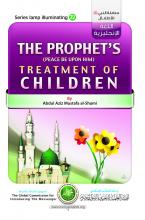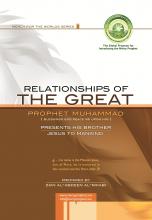The Prophet of Mercy Website
Muslim World League - Global Commission for Introducing the Messenger
His Life at a Glimpse
The Madinan Period - Before Islam came to Madinah, its inhabitants belonged mainly to three communities: the two Arab tribes of `Aus and Khazraj and the Jews, in whose hands was much of the city's wealth and who dominated its economy largely through the practice of monopoly and usury. Rifts between the two Arab tribes were promoted by the Jews who profited from money-lending toward war efforts and the sale of weapons.
The universal nature of Islam was confirmed early in the Prophet's mission, while a small number of his followers were being oppressed in Makkah. At that time Allah had revealed: "And We have not sent you except as a mercy for the worlds."[1] Again, while yet in Makkah, Allah instructed him: Say, "O mankind, indeed I am the Messenger of Allah to you all, [from Him] to whom belongs the dominion of the heavens and the earth. There is no god except Him; He gives life and causes death.
The Makkan Period - The first signs of prophethood came in the form of dreams, which inevitably came true shortly after their occurrence. Then, at the age of forty, while he was alone as usual in the cave, the angel Gabriel[1] appeared before him, commanding him to recite. Muhammad replied truthfully, "I am not one who can recite." He had never indulged in the recitation of poetry, a favorite pastime of his contemporaries among the Arabs.
The revelations that came to the Prophet during the Makkan period dealt mainly with matters belief - the unity and exclusiveness of Allah, His absolute power and ability, and His mercy. It informed of the Judgement, the rewards and punishments of the Hereafter, and the personal responsibility of every soul. It taught morality, piety, patience, the spirit of sacrifice, and dependence upon Allah. It comforted the believers in hardship, giving examples of the difficulties faced by the earlier prophets in their struggle to re-establish the worship of Allah on earth.
Member of a family and community - Despite his extraordinary spirituality and indifference to the world, he was not heedless of central aspects of life nor did he neglect its duties and responsibilities. He did not forget that he was a husband, father, grandfather, relative, neighbor, friend and leader, and that each of these has obligations toward others. He was a human being, one that could be pleased, angry, happy or sad. He would joke with his companions at times, yet not speak except the truth.
Taken from the introductory class to the lecture series entitled “Seerah:Lessons and Morals” delivered by Abu Ammar Yasir Qadhi5 at Masjid At Taqwa6 in Houston, TX in the Summer of 2005
Bismillahir Rahman Ar Raheem
Before we go any further in this topic of seerah we have to take a very important thing into consideration. The importance of this is related to us in the following hadith of the Prophet (Sal Allahu Alayhi Wa Sallam)1:
With the lifting of the boycott, 619 CE should have been a year of celebration. However, two events transpired that year, which would forever characterise 619 CE as the year of sorrow. In rapid sucession, the Prophet’s (peace be upon him) uncle and guardian, Abu Talib, and the Prophet’s (peace be upon him) wife, Khadijah, both died, with the former dying during either Rajab or Ramadan of 619 and with the latter dying during Ramadan of 619 CE.
Question:
I want to know the names of the famous persons/Kings who embraced islam after accepting invitation from Prophet Muhammad?.
The Prophet Muhammad (peace be upon him) taught us that prayer is a way of saying how we need God's grace for every single thing we have, and how God's power over all things is total. There are different kinds of prayers. Some are to praise Allah for all the wonderful things in the world and some are to thank him for his blessings. We often ask Allah to forgive us, telling him our fears and worries. At other times we pray for others to be helped and cared for.
Contributed by Sheikh Rajab Deeb
The Real Image of Prophet Muhammad
Mercy to Kids: Anas always greeted children as he passed them, saying that he did so because he had observed the
Prophet doing the same thing. ( Bukhari and Muslim) Ibn `Abbas said that the Prophet used to hold the first of any
seasonal harvest, he used put it on his eyes then on his lips and say “Oh Allah! Like you have made us see its
beginning (of the season), allow us to see its end.” Then he would give it to any child sitting around him."
(Tabarani)







